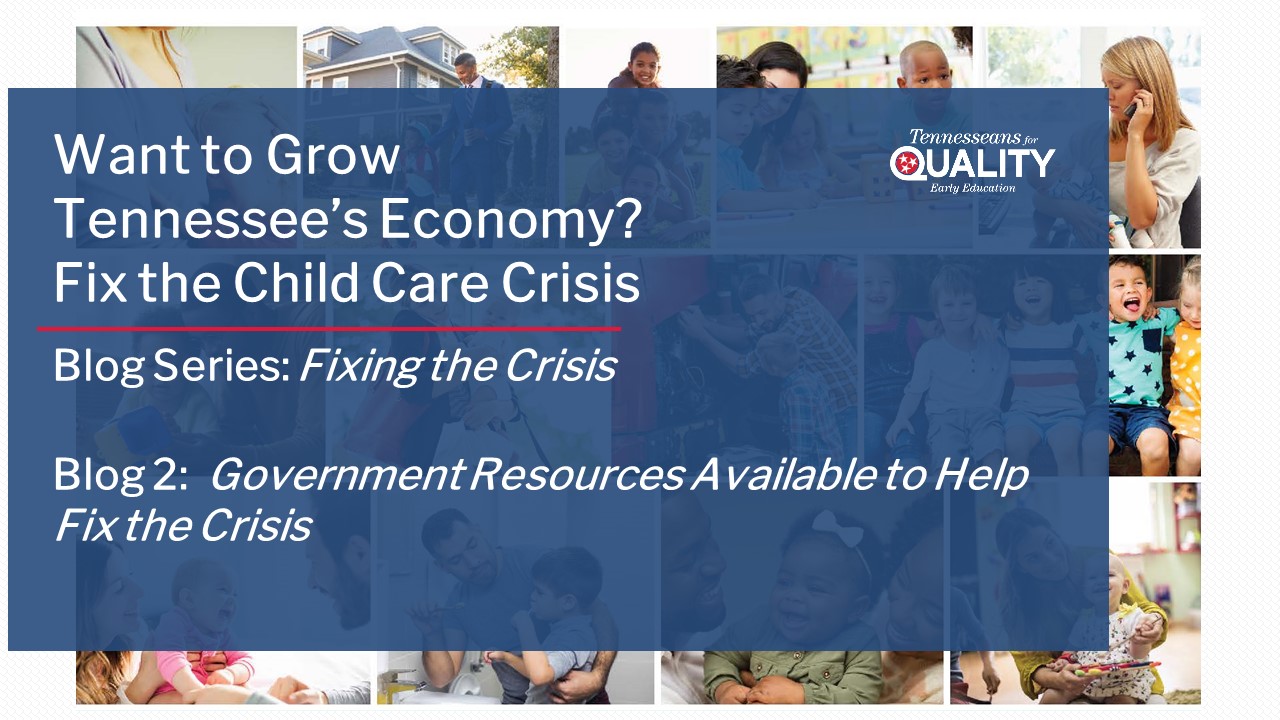As mentioned in our Child Care Crisis Solutions Series Introduction, child care plays many roles in Tennessee’s economy. It’s a business, a job, an early education, and a crucial work support for working families. And while private sector can and should be part of the solution to the crisis, government has a major role to play as well.
The good news is that there are many government resources available to address the crisis. They need only be used more effectively for that purpose. Below are some of the major government resources which should be mobilized more strategically.
This blog post is not meant to be an inclusive list and does not imply any specific recommendations. Instead, it is intended to give policy-makers and advocates an idea of the magnitude of the existing resources at Tennessee’s disposal as we look towards creating a new and improved child care system that can better meet the needs of Tennessee families and employers.
We begin with four buckets: The Big Pots of Federal Funding, Training and Development of the Child Care Workforce, Entrepreneurship and Small Business Support, and Tax Credits.
The Big Pots of Funding Come Through Tennessee Department of Human Services (TDHS)
There are two major federal funding streams supporting child care that flow to and are distributed through the Tennessee Department of Human Services (TDHS). Over recent years, approximately $1 billion has been left untapped.
The Child Care and Development Fund (CCDF) is the main source of federal funding dedicated primarily to child care subsidies for low-income working families. States receive allocations each year based on a formula. In 2019 Tennessee’s allocation was $189 million.1 The program gives significant authority and flexibility to states in designing child care programs and flexibility for parents in selecting child care. Income eligibility is 85% of the state median income; and parents must be working or attending job training or education unless the child is receiving or in need of protective services. Over the past five years, nearly $300 million in CCDF funds allocated to Tennessee have been left unspent.2
The Temporary Assistance for Needy Families (TANF) program is designed to help needy families achieve self-sufficiency. States receive annual block grants to design and operate programs that accomplish the purposes of the program. While TANF is best known for supporting time-limited cash assistance to low-income families with children, state TANF programs commonly support a wide range of activities to ameliorate the causes and effects of child poverty, often including child care services. In 2019, Tennessee continued a recent pattern of using only a portion of its $190 million federal block grant allocation. Unused funds can be carried over into a fund balance for use in future years. As of end of FY 2019, TN had the largest TANF unspent and unobligated fund balance in the nation at a staggering $732 million.3
Both TANF and CCDF are ongoing annual federal allocations. Together with the TANF fund balance these resources are a unique, significant resource that can and should be used strategically to address child care challenges for working Tennessee families.
Resources that Can Be Leveraged to Support Training and Development of the Child Care Workforce.
Quality of child care is 100% dependent on the early childhood education knowledge and skills of the teaching workforce. That’s why there’s such an emphasis on teacher training and education by accrediting bodies such as NAEYC, as well as by HeadStart, and the Tennessee Star Quality Rating System, among others.
TECTA and CCR&Rs. TDHS directs some of its federal child care funding toward training and education support for early childhood professionals through two major vehicles. The Tennessee Early Childhood Training Alliance (TECTA) provides professional development with academic degree credit possibilities for Tennessee’s early childhood education personnel; and it has offices at 8 post-secondary education institutions across the state. The Child Care Resource and Referral Agencies (CCR&Rs), among other services, offer “quality coaches” which provide licensed child care professionals with training and technical assistance on such topics as quality, health and safety, and family engagement.
Workforce Innovation and Opportunity Act (WIOA) is a federal program designed to help job seekers access employment, education, training, and support services to succeed in the labor market and to match employers with the skilled workers they need to compete in the global economy. The Tennessee Department of Labor and Workforce Development oversees the WIOA program in our state, and operates through a network of local workforce development boards (LWBDs). These LWBDs and their partners provide career guidance, skills assessment, job search assistance, job placement, education, training, and supportive services to serve people with barriers to employment. A major goal of WIOA is to require the nation’s many workforce training programs be coordinated to ensure they work in tandem, providing consistent and seamless services to job seekers and employers.
Career and Technical Education in Tennessee’s High Schools. Tennessee’s high schools have large budgets and programming for career and technical education training through Tennessee Department of Education CTE division. In fact, Early Childhood Education Careers is a priority within the education career cluster. Schools can easily and inexpensively support interested students to achieve a Child Development Associate Certificate (CDA) while in high school which will prepare them for a child care teacher assistant position immediately following graduation (or before). Creative public/private partnerships arrange internship and apprenticeship programs for students with local child care agencies to support student career pathways and supplement the child care workforce.
Tennessee Promise/Tennessee Reconnect and Post-Secondary Education. The Tennessee Promise program made Tennessee the first state in the nation to guarantee college for any graduating high school senior. It’s a last dollar scholarship that covers tuition and fees at any of the state’s 13 community colleges, 27 colleges of applied technology, or other eligible institution offering an associate degree program. Most of these institutions offer certificates or associate’s degrees in child development, which will prepare a student to advance along the career pathway as a child care/early education teacher or child care business owner. Like the high school programs mentioned above, partnerships with local child care provider employers that arrange apprenticeship and internships can be of benefit to students, providers and the children in their care. Tennessee Reconnect is a companion program for adults seeking to return to higher education to gain new skills and degrees and advance in the workplace.
Entrepreneurship and Small Business Development Support
Tennessee has a large child care industry sector, and needs to grow substantially to meet market demand. There are 13,185 market-based child care providers with revenue of $752 million in Tennessee; down 11.4% since 2010. At the same time, 48% of Tennesseans live in a child care desert, and 65% of parents with children under age 5 report difficulty accessing suitable child care. Part of that is because the business model of operating a child care can be challenging, keeping costs affordable to parent customers while paying child care workers or oneself enough to make a decent living. The majority of providers are small businesses which, like most across all industries, could benefit from general business development support, or shared back office services. (See our blog on The Shared Services “Hub” Model for Child Care). Furthermore, child care is still largely a pencil and paper operation, and therefore ripe for technology adoption and innovation. (See our blog on How Technology Can Be a Game-Changer for Child Care).
Tennessee Small Business Development Center Network (TSBDC) is provides general business planning and advising, research, training and technical support for small businesses. Most of the centers are based at community colleges. The US Small Business Administration provides funding to the state for this program.
Tennessee Department of Economic and Community Development (ECD) offers a team of knowledgeable economic and business development professionals, and a menu of grants and incentives programs and tax credits to help grow Tennessee’s economy. Most of the currently offered incentives would not be immediately applicable to the traditional child care industry, but as we look ahead and to thinking outside the box on growing the child care industry, it’s nonetheless worth noting this function and resource of state government.
Launch Tennessee is a state supported public-private partnership chaired by the Commissioner for ECD. It supports entrepreneurs from ideation to exit. Through their statewide partner network, they deliver curriculum, mentors and more to entrepreneurs to build high-growth potential businesses. Again, most of the programming offered does not immediately lend itself to the traditional child care industry, but as the industry moves towards creative business models and new technologies (think Wonderschool – the AirB&B of Family Child Care Homes), it’s worth noting this resource exists.
The Child and Adult Care Food Program (CACFP) is a federal program that provides reimbursements for nutritious meals and snacks to eligible children (based on federal poverty guidelines for free and reduced price meals. We list CACFP in this section because while it’s a social services program, it’s a reimbursement program which can offset the food costs for child care operators who might otherwise offer and pay for meals and snacks as a cost of doing business.
Tax Credits / Tax Code
There are several existing types of federal tax credits available to Tennessee parents that could potentially be mobilized more effectively to optimize Tennessee’s child care system.
The Child Tax Credit offers parents up to $2000 credit per qualifying dependent child 16 or younger if they’ve provided at least half of the child’s support and the child has lived with them for at least half the year (with a few exceptions).
The Child and Dependent Care Tax Credit provides a tax break for parents who paid for child care or similar cost for a qualifying child under age 13. Credits can go up to $3,000 for one child or dependent, or $6000 for two or more.
The Earned Income Tax Credit is for working people with low incomes that increases with the number of children a parent has. The maximum is $6557 for a parent with 3 or more children earning maximum $50,162 as a single or $55,953 as a joint filer.
For employers, we mentioned earlier the tax credits offered through ECD. Additionally, there is the Work Opportunity Tax Credit (WOTC) which is designed to encourage the hiring from eligible groups of individuals including veterans, people living in designated low-income neighborhoods, receiving TANF or other forms of public assistance.
And while not in Tennessee, we mention a tax credit program of our neighboring state of Louisiana as a reference for what’s possible with child care tax credits. Louisiana School Readiness Tax Credits allow tax breaks to families, child care providers, child care directors and staff, and businesses that support quality child care.
And that concludes the blog on public resources available to potentially support Tennessee. Please let us know if you have ideas or resources to share on this topic! And be sure to check out our other blog posts in our Child Care Crisis Solutions Series:
BLOG 1: Fixing the Child Care Crisis: Introduction
BLOG 2: Government Resources Available to Fix the Child Care Crisis
BLOG 3: Shared Services Networks: A Smart Solution for Growing More Affordable, High Quality Child Care
BLOG 4: How Technology Can Be A Game Changer for Child Care
BLOG 5: Business Strategies for Supporting Employee-Parents
1 Tennessee Department of Human Services
2 Tennessee Department of Human Services
3 Previously provided 2018 surplus number was updated in November to reflect the latest, 2019 surplus amount cited by the Beacon Center’s Poverty to Prosperity report





